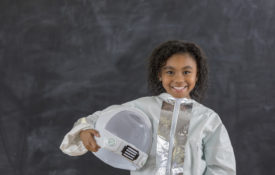-

Encouraging Girls to Roleplay as Successful Female Scientists Could Help Close the Gender Gap in STEM
Girls may persist longer in science activities when they pretend to be successful female scientists. This kind of play-based intervention could help close the gender gap in science, technology, engineering, and math (STEM) fields.
-
Fetuses Smile for Carrots but Grimace Over Kale, Study Suggests
While it is known that some children are not huge fans of greens, a new study suggests that such dietary preferences could come about before they're even born. Fetuses create more of a "laughter-face" in the womb when exposed to the flavor of carrots consumed by their mother and create more of a "cry-face" response when exposed to kale, according to a study published in the journal Psychological Science on Wednesday. "We decided to do this study to understand more about fetal abilities to taste and smell in the womb," lead researcher Beyza Ustun, a postgraduate researcher in the Fetal and Neonatal Research Lab at Durham University in the UK, told CNN Thursday via email.
-

The September Collection: New Technology Can Be Scary, Why to Stop Worrying and Love the Eco-Apocalypse, and Much More
In this episode, cognitive psychologist Ludmila Nunes and her colleague Amy Drew, APS’s Director of Publications, discuss five of the most interesting new articles from the APS journals.
-
Playing an Instrument Is Linked to Better Cognition
From strumming a guitar next to a campfire to entertaining guests with a piano piece at a formal dinner, being able to play a musical instrument is unquestionably rewarding. Yet, evidence suggests that the rewards go far beyond the elation of performing well in front of others—those who play instruments have often been found to perform better on cognitive tests too. Enhanced cognition is well-known to be linked to a range of positive life outcomes such as getting a better job and enjoying improved health. However, it has remained unclear whether these enhanced cognitive skills are just temporary.
-
How Universal Are Our Emotions?
There’s nothing like migration to reveal how things that seem natural may be artifacts of culture. When I left India for college in England, I was surprised to find that pinching my Adam’s apple didn’t mean, as I had thought it meant everywhere, “on my honor.” I learned to expect only mockery at the side-to-side tilts of the head with which I expressed degrees of agreement or disagreement, and trained myself to keep to the Aristotelian binary of nod and shake.
-
3 Common Thinking Traps and How to Avoid Them, According to a Yale Psychologist
The mind is a tricky thing. It can lead us to believe that we can confidently sing "Bohemian Rhapsody" at karaoke even though we haven't heard the song in years, or that one terrible review on Yelp is reason enough not to go to a 4-star rated restaurant. These thinking errors are what people in the psychology community call cognitive biases. And that's the focus of a new book out this month, Thinking 101: How to Reason Better to Live Better, by Yale psychology professor Woo-kyoung Ahn. In the book, Ahn highlights some of the most pernicious cognitive slip-ups we make — and how biases can cloud our judgment and affect the people around us. ...

